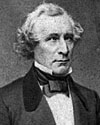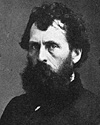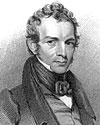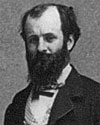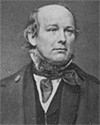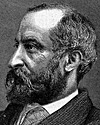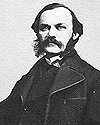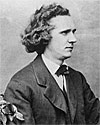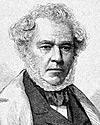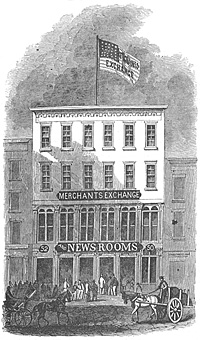
Merchants’ Exchange and Newsroom, 50 and 52 Pine Street New York
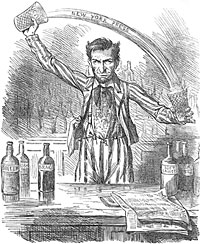
Abraham Lincoln
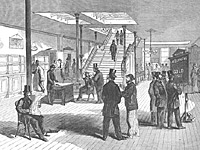
Lower Room of the Merchants’ Exchange and Newsroom
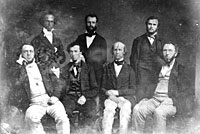
Editorial staff of the New York Tribune
“In Lincoln’s time the bigwigs of the press and politics often were one and the same,” wrote wrote Lincoln chronicler Herbert Mitgang.1 Lincoln Administration officials frequently had a poor opinion of New York politicians and journalists. Secretary of the Navy Gideon Welles wrote in his diary on August 13, 1864: “The worst specimens of these wretched politicians are in New York City and State, though they are to be found everywhere. There is not an honest, fair-dealing Administration journal in New York City. A majority of them profess to be Administration, and yet it is without sincerity. The New York Herald with a deservedly bad name, gives tone and direction to the New York press, particularly those of Whig antecedents and which profess to support the Administration. It is not, of course, acknowledged by them, nor are they conscious of the leadership, but it is nevertheless obvious and clear. When the Herald has in view to defame or put a mark upon a man, it commences and persists in its course against him. He may be the friend of the Tribune and Times. Of course, they do not at first assent to what is said by the Herald. Sometimes they will make a defense,—perhaps an earnest and strong one,—but the Herald does not regard it and goes on attacking, ridiculing, abusing and defaming. Gradually one of the journals gives way, echoes slightly the slanders of the Herald, and having once commenced, it follows up the work. The other journals, when things have proceeded to that length, also acquiesce. This is a truthful statement of the standing and course and conduct of the papers I have named.”2
The President’s three chief assistants — John G. Nicolay, John Hay, and William O. Stoddard all regularly submitted their own articles under pen names to New York publications, but they too were critical of the New York City journalism. Stoddard wrote in one of these dispatches in July 1862 a critique of the New York press critique of President Lincoln’s policies recommending compensated emancipation of slaves in Border States:
Allow me to say that the course of certain prominent portions of the New-York press is without parallel in the history of American journalism. The conservatives, falsely so called, seem to be in an agony of fear less the President is on the eve of launching the country into a war of rapine, pillage and destruction. The fanatical radicals are in a foaming rage because he makes provision for the carrying out of his proposition to the Border States representatives, even in his army orders.
The whole secret is here: so accustomed are these gentlemen to the juggling illusions of party platforms and political manifestoes, that they can neither understand nor appreciate an honest man who is in earnest. They seem unable to conceive that the President actually means to go to the insane length of keeping his word, and that Union men in the Border States are to be compensated under any circumstances; for this, and no more, is the meaning of the ‘compensation’ clause in the President’s order relative to the employment of slaves. They may rest assured that the policy thus marked out will be religiously observed until the end. On the other hand, do those who, for an opposite reason, condemn the same action of the Executive, forget that all this has been again and again foreshadowed in previous documents from the same hand? It is time that we all understood the man in whose strong hand we have placed our destinies, and were ready to believe that to all men, and in all circumstances, he will do what he says. It will be well for those to whom the Confiscation act is addressed, if they will take the same wholesome unction to their souls.3
Stoddard asked too much of New York’s editors who found solace in enmity. “New York city was the nation’s newspaper capital in 1860, and [Horace] Greeley was one of its three principal editors (the others being [Henry J.] Raymond of the Times and [James Gordon] Bennett of the Herald). Harper’s Illustrated Weekly called the three editors, in jest, ‘the Three Graces.’ They all despised one another,” wrote James M. Perry in The Bohemian Brigade. “The three men, keenly competitive, would cover the war with more passion than good sense. Relying heavily on the telegraph, they would often rush news into print without any background checking. Being first was what matter most.”4
The importance of New York’s editors were typified by these three men — the New York Herald‘s erratic but Democratic-leaning James Gordon Bennett and the New York Tribune’s erratic but Republican Horace Greeley, and The Times more cautious but also more politically influential Henry J. Raymond. Greeley biographer William Harlan Hale wrote: “To Bennett, quickly hoisting the appropriate colors, the war became a colossal news story, and he covered it with his full genius for capturing each human detail. For Greeley it remained a moral struggle in whose toils he was deeply involved, and his attention kept shifting from its outward news content to the state of his own mind and conscience — a condition which changed so much as to keep him pretty busy reporting on that.”5
Historian David Donald wrote: “James Gordon Bennett, the sinful and unscrupulous editor of the New York Herald, was one of the most powerful newspapermen of his day. Spiced with sex and scandal, the Herald had the largest circulation of any American newspaper, and it was a potent agency in shaping public opinion. Bennett had opposed Lincoln in 1860, and throughout the war he kept up a criticism that was all the more painful to Lincoln because it was well informed and witty. In 1864 Bennett hoped that Grant would run for President, and he also flirted capriciously with Democratic General McClellan. For Lincoln he had no use.”6
Well-connected New York City attorney George Templeton Strong wrote in December 1863: “The New York Herald has discovered that within a day or two General [Ulysses S.] Grant is to be next President and expatiates on his claims and merits in slashing, slangy editorials. Its former pet, [General George B.] McClellan, seems forgotten. Grant is certainly our most successful general and might probably make a good President, but that the Herald takes him up so earnestly is against him.”7 Indeed, Bennett flirted with Grant up to the end of the 1864 campaign — suggesting that Electoral College voters “are free constitutional agents to perform a certain great and solemn duty, and this alone; they are in fact, bound to perform it without regard to any other consideration than that of selecting the best men for these high offices.”8 In other words, they should vote for Ulysses Grant rather than Abraham Lincoln. According to Bennett biographer Oliver Carlson, “Bennett decided to whoop it up for Grant as a presidential candidate. The reporters were ordered to give him the appropriate build-up. Soon every page of the Herald carried some news about Grant. And the editorial page began to speak of him as ‘The People’s candidate.”9
The New York editors tried to involve Mr. Lincoln in one fight even before he became President in March 1861. Horace Greeley wanted to be elected Senator in February 1861 — to replace outgoing New York Senator William H. Seward. Thurlow Weed — editor and publisher of the Albany Evening Journal, Republican political boss, and top Seward ally — was determined that he wouldn’t be. “A couple of newspapermen. It was an historic battle. Greeley himself did not go to Albany in February, when the legislature was to pick a senator, but he was ably represented by his assistant, Charles A. Dana, later editor of the Sun,” wrote historian Donald Barr Chidsey. “Both sides appealed to the President-elect for support, but Lincoln wisely kept out of it.”10 When Greeley seemed to be on the verge of a come-from-behind-victory, Weed threw his support to a dark-horse candidate, Albany Judge Ira Harris. Greeley was defeated and Weed was partially avenged for the key role that Greeley had taken in blocking Seward’s presidential nomination in May 1860.
“Newspaper editors of the period seemed afflicted with a more or less chronic case of disgruntlement,” wrote historian James G. Randall. “As for Bennett, pungent wrath seemed to be his stock in trade. Whatever the cause or lack of cause, newspapers at an early stage joined in an almost concerted movement to force an overthrow or reconstruction of the cabinet. Pointing out that Lincoln was responsible to the people while the cabinet was moved by selfish motives, the Herald harped upon the theme of cabinet change of ‘Something Wrong in High Quarters.’ This paper did not conceal its fear that the administration’s ‘feeble’ measures toward the ‘rebellion’ would weaken the Union cause in European eyes.”11
New York editors had two sets of enemies — political ones and journalistic ones. “‘You lie, you villain! You know you lie!’ Greeley once hurled at William Cullen Bryant, in capital letters. The author of Thanatopsis nearly choked with rage. Greeley had pilloried him in a purely Pickwickian sense, quite unconscious of the fact that he had made use of an offending idiom. Besides, Bryant had not lied. He had merely said something in a way to annoy the editor of the Tribune,” wrote Greeley biographer Don C. Seitz.12 By the time of the Civil War, these editorial disputes had subsided somewhat. They were primarily literary and political rather than the physical assaults of two decades earlier.
“In Greeley’s day journalists customarily indulged in derogatory verbal combat; but to this Greeley added a passion seldom rivaled, and not all who received his blasts deserved them,” wrote another Greeley biographer Jeter Allen Isely.13 Greeley, for example, blasted Herald editor James Gordon Bennett as a “low-mouthed, blatant, witless, brutal scoundrel.” His abuse stemmed from a peculiar shortcoming, according to Isely: “His was a sensitive soul! To attack his policies was to impeach his personal integrity, and he answered his calumniators with an abusive tongue.”14
English journalist Edward Dicey, who visited New York City in early 1862, argued that “one great merit of the American press is its comparative freedom from private personality. The virulent and discreditable invectives with which Bennett and Greeley besmear each other and themselves in the Herald and Tribune are not fair illustrations of American journalism.”15 But another English journalist, William Howard Russell, who visited New York in March 1861, had a somewhat more favorable impression of New York editors after a breakfast he shared with leading journalists: “There was a good deal of pleasant conversation, though every one differed with his neighbour, as a matter of course, as soon as he touched on politics.”16
But such surface congeniality had turned ugly after the nomination of Abraham Lincoln in Chicago in May 1860. In the early 1850s, Henry J. Raymond of the Times had replaced Horace Greeley as the favorite journalist of Thurlow Weed and William H. Seward. Horace Greeley nourished his grievances against the trio until the 1860 Republican convention at which he worked hard against Seward’s nomination. Greeley biographer Don C. Seitz wrote; “The New York delegation came home sore at Greeley. Henry J. Raymond paused at Auburn to talk the defeat over with Seward. From that Point he sent a snapping letter to the New York Times assailing the Tribune‘s editor, and now for the first time the ‘partnership’ letter received public mention, as the dark reason for the hostility exhibited at Chicago.”
‘The main work of the Chicago Convention,’ wrote Raymond, ‘was the defeat of Governor Seward,…and in that endeavor Mr. Greeley labored harder and did tenfold more than the whole family of Blairs, together with all the gubernatorial candidates to whom he modestly hands over the honors of the effective campaign. He had special qualification as well as special love for the task, to which none of the others could lay any claim….Mr. Greeley was in Chicago several days before the meeting of the Convention, and he devoted every hour of the interval to the most steady and relentless prosecutions of the business that took him hither — the defeat of Governor Seward. He labored personally with the delegates as they arrived, commending himself always to their confidence by professions of regard and the most zealous friendship for Governor Seward, but presenting defeat even in New York as the inevitable result of his nomination….While the contents of Greeley’s letter of November 11, 1854, to Seward were known to some of Seward’s supporters who were working at Chicago, no use was made of this knowledge in quarters where it would have disarmed the deadly effect of his pretended friendship for the man upon whom he was thus deliberately wreaking the long hoarded revenge of a disappointed officeseeker.'”17
The problems among these editor-politicians dated to 1854 when editor-politician Thurlow Weed decided to put editor-politician Henry Raymond on the Whig ticket for lieutenant governor rather than Raymond’s former boss, editor-political Horace Greeley. Greeley had really wanted the nomination for governor, but when that became impossible, he thought a lesser office would suffice. Greeley biographer Seitz wrote: “Weed was a shrewd and able man, who filled his pockets by the sale of laws and the influence of his Albany Evening Journal. Whatever his motive, honest or corrupt, for keeping Greeley off the ticket, politically it was sound. Public office was no place for a man who would not submit to control, either by himself or a boss. Weed may have killed off Greeley’s ambitions in all kindness, and the chances are that he did. He knew a great editor would descend a long way when he assumed so small a place as that of lieutenant-governor.”18
The 1860 national convention reignited these old grudges. Republican newspaper wars erupted in the wake of the 1860 Chicago Convention among the newspapers run by Weed, Raymond and Greeley. Greeley came under attack from Weed, who charged that Greeley had torpedoed the presidential candidacy of William H Seward. “Misrepresentation has achieved its work,” the Albany Evening Journal editorialized: “The recognized standard bearer of the Republican party has been sacrificed upon the altar of fancied availability. The sacrifice was cruel and unnecessary.”19
Greeley in turn asserted that he had broken with the Seward-Weed machine six years earlier when it torpedoed his political ambitions. “The most careful scavenger of private letters or the most sneaking eavesdropper that ever listened to private conversation, can not allege a single reason for any personal hostility on my part against Mr. Seward. I have never received from him anything but exceeding kindness and courtesy. He has done me favors (not of a political nature) in a manner which made them still more obliging; and I should regard the loss of his friendship as a very serious loss. Notwithstanding this, I could not support him for President. I like Mr. Seward personally, but I love the party and its principles more,” wrote Greeley.20
“Others joined the fray, and charges old and new were hurled at the head of the Albany Dictator,” wrote Weed biographer Glyndon Van Deusen. “The New York Express circulated a story that Weed had taken $17,500 to put a bill through the legislature reducing the ferriage between New York and Brooklyn from two cents a person to one cent, only to return the money to the interested parties on the ground that he did not care to break with the lobbyist of the ferry company.”21 James Watson Webb, editor of the Courier and Enquirer, blasted Greeley’s denial of responsibility for Seward’s defeat by writing that “a more deliberate and wicked falsehood than this never found publicity, even through the columns of the Tribune.”22 Webb’s repeatedly referred to Greeley as a “viper.”23 The Times‘ Raymond attacked Greeley’s convention lobbying of delegates “by professions of regard and the most zealous friendship for Governor Seward but presenting defeat, even in New York, as the inevitable result of his nomination.”24
And so a pattern was set for the Lincoln Presidency. There were political wars in New York. There were press wars in New York with Mr. Lincoln’s opponents. And there were press wars in New York among Mr. Lincoln’s supposed political friends — some of whom had at one time worked for each other. For Mr. Lincoln, keeping it all straight must have been like shoveling fleas. These conflicts aggravated and aggrieved President Lincoln, but he understood the importance of these editors too well than to ever cease trying to pacify them. Because some of them were as unpredictable as they were irritable, this was a trying task.
“The quarrel between Weed and Greeley did not confine itself to the Senatorial contest and distribution of the Federal patronage,” wrote Greeley biographer Ralph Fahrney. “A sharp personal antagonism arising with the Chicago convention, continued unabated throughout the Civil War. Greeley freely accused the Albany boss with corruption and his honesty, and the latter replied in kind by terming his opponent ‘a fanatic, dazed, muddle-headed aspirant for office’ who profiled by illicit trade in southern cotton and intrigued with foreign representatives for a dishonorable peace. Friends were involved in the charges and countercharges of fraud and corruption, and the whole affair produced an atmosphere of distrust and confusion far from conducive to the most efficient prosecution of the war.”25
The battles continued for most of the Civil War. When they weren’t criticizing each other, the editors criticized the President. The criticism was particularly pointed in the months in 1861 between the attack on Fort Sumter and the First Battle of Bull Run. The editors were impatient for victory. “Except for the Evening Post, even the administration organs turned from support to criticism,” noted Bennett biographer Oliver Carlson. “‘Wanted — A Policy’ wrote Raymond in the Times, as he tried to prod the President. He charged that the administration ‘exhibited a blindness and a stolidity without parallel in the history of intelligent statesmanship,’ and Lincoln was accused of having spent time and strength in feeding rapacious politicians ‘which should have been spent in saving the Union.”26 Of course, some of the rapacious demands for patronage came from the newspaper editors themselves.
Other press feuds erupted as well. The sharp pens of Herald editor James Gordon Bennett and Tribune editor Horace Greeley were frequently involved. After the bombardment of Fort Sumter, the Herald came under attack by a mob angered by his pro-South editorial policies and by Horace Greeley capitalizing on the Herald‘s capitulation to the mob. Tribune editor Ralph R. Fahrney wrote: “Greeley utilized the flag raising affair as a convenient means of launching repeated thrusts at Bennett, and throughout the war the two influential New York editors jabbed at each other with a ferocity, and vindictiveness unequalled in the realm of personal controversy. The Tribune denounced ‘old Bennett,’ as an ally of traitors. The Herald referred to ‘Massa Greeley,’ a denomination designed to cast derisive reflections upon his anti-slavery proclivities. It dismissed the Tribune version of the flag raising episode as a ‘silly fabrication,’ and countered in connection with the New York Senatorial contest, over which Greeley and Dana were supposed to have engaged in a violent quarrel which ‘shook the Tribune office from top to boom’ and created no end of amusement for a crowd of ‘excited Spectators’ in the street below.”27
Such battles led to no truces. “Greeley as a Political Cheat and a Hypocrite” was the headline on a Bennett column in December 1862 in which he wrote that Greeley “attacks jobbery in his paper and practices it in person, and who eats no meat at dinner, but sups his full of bloody horrors whenever he can inveigle our troops into a rebel trap.”28
One of the hallmarks of these newspapers — even the Republican ones — was their inconsistency. “Lincoln had been in office less than a month when two of the Republican newspapers in New York, Greeley’s Tribune and Raymond’s Times, joined the antiadministration press, which was urging compromise with the South or letting the secessionist states depart, in attacking him. During the first weeks of the crisis, Greeley had wavered in his views, sometimes arguing that coercion could not be employed to maintain the Union, since it would mean war, and sometimes arguing that the southern states should be allowed to leave if they wished. Raymond, on the other hand maintained steadily that the Union should be preserved, short of war preferably but by war if necessary. When Lincoln did nothing to reinforce the garrison at Fort Sumter and the seceding states had established the Confederacy, both Greeley and Raymond, as if by prearrangement, came out on April 3 with editorials assailing him for indecision and inactivity. ‘Come to the Point!’ the Tribune exhorted in the title of his editorial, and the Times advertised: ‘Wanted — a Policy.” wrote historian Charles H. Brown. The Post‘s William Cullen Bryant was at the time comparatively patient in his own commentary, suggesting to the Times and Tribune that “it is not so very easy to decide what course of policy is best suited to the emergency”.29
Bennett lambasted Republicans early in 1861 for causing the breakup of the Union, but after the bombardment of Fort Sumter in April, he switched to a more pro-Union policy — prompted in part by a pro-Union mob threatening to burn down his newspaper. Greeley reveled in his discomfort. But then Greeley’s Tribune led the “Forward to Richmond” campaign which led to the humiliating Union defeat at Bull Run on July 21, 1861. Greeley biographer wrote that “the enemies of Greeley, making the most of a fickle public opinion, rose to the defense of the government and unloaded the blame at the door of the Tribune Office — the source of clamorous ‘On to Richmond’ editorials alleged to have forced General [Winfield] Scott to acquiesce reluctantly in a movement destined from the start to end in a disastrous and humiliating defeat. Such an explanation gained a wide acceptance in the minds of a despondent public, and no one utilized it with more telling effect than Raymond of the Times and the vindictive Bennett of the Herald, the latter ever alert to point a telling jibe at the ‘ferocious Jacobins’ of Spruce and Nassau Street.”30
When Democratic gubernatorial candidate Horace Seymour came under attack for his patriotism in 1862, the Albany Argus came to his defense by pointing outing the criticism which Republican J. Raymond had himself voice against the Lincoln Administration: “Behold the record of treason to the government, spiced by abuse of President Lincoln, slanders of our armies, and assaults upon our generals, furnished by his own pen.” Historian Sidney David Brummer noted that “Then followed two columns of extracts from the Times labeled thus: ‘Raymond Predicts and Justifies a Usurpation,’ ‘Raymond Discourages Enlistments,’ ‘Raymond Assails the Government as Imbecile,’ ‘Raymond Demands the Removal of McClellan,’ ‘Raymond Calls for a Change of Generals, Cabinet and President,’ etc.”31
Elmer Davis wrote in The History of the New York Times that “not all the hazards of the Civil War were experienced by men in the field. The ‘internal front’ as painfully known in recent years was one of the great facts of the Civil War also, though men had not then given it a name; and the internal front in New York became in July, 1863 one of the liveliest portions of the fighting line when troops had all gone to Pennsylvania to stop Lee and the draft riots broke out. Raymond was no more afraid of rebellion across the street than of rebellion in the cotton states. Some of the New York papers, congenitally sympathetic not only with the Southern Confederacy but with Tammany Hall and the elements from which that body and the draft riots both derived their chief support, found it convenient as well as congenial to pat the mob on the head.”32
The Times was never attacked by draft rioters although it had three Gatling guns and numerous rifles to defend the premises against rioters. The nearby Tribune was not so lucky and the first floor of its offices was invaded and trashed during the draft riots of 1863. Two years earlier, the pro-South Herald was surrounded by an angry mob and escaped attack by raising the Stars and Stripe .
Editors had valid reasons to fear their fellow citizens who disagreed with their editorial policies.. “Shortly after Lincoln’s election, the Tribune‘s trustees anticipated that many of New York’s Southern sympathizers would blame Greeley’s paper for Lincoln’s victory — and what was fast becoming the threat of war,” wrote Janet E. Steele in The Sun Shines for All: Journalism and Ideology in the Life of Charles A. Dana, “On December 27, one week after South Carolina seceded from the Union, the trustees appointed a committee to strengthen the door of the Tribune press room ‘in such a manner…that it would withstand sudden mob violence.'”33
Such precautions proved insufficient in July 1863 when rioters trashed the first floor of the Tribune offices. The Herald had its confrontation with a New York mob two years earlier. Its pro-Southern slant enraged a pro-Union mob after word reached New York City about the Confederate attack on Fort Sumter. The mob surrounded the Herald headquarters while staffers barricaded themselves indoors. The Tribune subsequently reported that the protestors demanded that Herald raise the Stars and Stripes above the building but that the newspaper didn’t own one — a charge that the Herald denied and demonstrated its patriotism by raising more than a dozen American flags. Bennett biographer Oliver Carlson wrote:
Actually, the mob had come determined to do damage. There was no flag available, so a Herald office boy hurried out through a rear entrance, reached a Broadway bunting store, and returned with a banner in the nick of time. The flag was duly displayed, and Bennett, standing so close to it he was all but wrapped in its folds, bowed profusely to the mob.
Fearful of any future mob action, and determined never to be caught unprepared again, the elder Bennett purchased a small arsenal of rifles and ammunition, which were stored behind special panels in the offices of the Herald. The guns were kept in perfect working order for a great many years as a grim reminder of the hectic night of April 14, 1861.34
The mob didn’t prevent the Herald from selling a record number of newspapers the next day — 135,000. Newspaper buying was driven by emotion and newspaper editors were driven by angst. Historian James M. McPherson wrote that the Union “setback of the Seven Days [Battle in July 1862] led to a round of scapegoat hunting. Northern newspapers accepted McClellan’s estimate that he had confronted 200,000 enemy soldiers. The Democratic press took its cue from McClellan and blamed the administration for failing to send him the reinforcements he requested. By implication the fault was Lincoln’s, but the Democrats concentrated their fire on Secretary of War Stanton (who had made no secret of his disillusionment with McClellan) and on radical Republicans whom they accused of deliberately sabotaging McClellan in order to get rid of him. Such men were ‘a faction of traitors,’ shouted the New York Herald, singling out editor Horace Greeley of the rival Tribune as well as Stanton. The Secretary of War was ‘the tool of the abolitionists, the organizer of disasters, the author of defeats.'”35
New York editors now extended the field of their gratuitous advice from political affairs to military ones. Historian George H. Mayer wrote: “In a country where every citizen regarded himself as a military expert, there was considerable support for the impatient clamor of the New York Times and the New York Tribune. The usually sensible Henry Raymond of the Times urged an immediate advance on April 23, and, a week later, he declared Lincoln a failure and proposed that Congress take control of the war.”36 Historian Glyndon Van Deusen noted: “During March the best that the New York Times and Tribune could do was to sum up his policy as one of ‘masterly inactivity.’ On April 3, the Times came out with a blistering attack upon a do-nothing government that had no policy other than a kind of Micawberish propensity for waiting for something to ‘turn up.”37
The support of New York newspapers was critical to presidential politics. Leonard Swett, a Bloomington attorney who was a close Illinois friend of President Lincoln, was worried that Mr. Lincoln was being too passive about his reelection prospects: Swett later recalled the situation President Lincoln faced in late 1863:
His rivals were using money profusely; Journals and influences were being subsidized against him. I accidentally learned that a Washington newspaper through a purchase of the establishment was to be turned against him, and consulted him about taking steps to prevent it. The only thing I could get him to say, was that he would regret to see the paper turned against him. Whatever was done had to be done without his knowledge. [James Gordon] Bennett with his paper you know is a power. The old fellow wanted to be noticed by Lincoln, and he wanted to support him. A friend of his who was certainly in his secrets (if it came out through a woman when a Frenchman would say, ‘Who is she? came to Washington and intimated if Lincoln would invited Bennett to come over and chat with him, his paper would be all right. Bennett wanted nothing. He simply wanted to be noticed. Lincoln in talking about N. said, ‘I understand N. Bennett has made a great deal of money, some say not very properly; now he wants me to make him respectable. I have never invited Mr. Bennett or Mr. Greel[e]y here — I shall not therefore, especially Mr. Bennett.
All Lincoln would say was, that he was receiving everybody and he should receive Mr. Bennett if he came.38
There may have been an element of defensiveness in Mr. Lincoln’s attitude. He knew that few people — including editors — ever visited him without seeking some favor. President “Lincoln endeavored to preserve peace between the Empire State’s Republican-Union factions, who had plunged into an unseemly newspaper war,” wrote historian Reinhard H. Luthin. He described the escalation of that war that took place three years later — just after the Republican-Union Convention in Baltimore in June 1864. Clearly, the city’s preeminent Republican newspapers were in full bicker:
When Bryant’s radically anti-slavery Post editorially stated that the sixth plank of the national platform, recently adopted at the Baltimore convention, really was an invitation to Lincoln to toss Secretary Seward and Postmaster General [Montgomery] Blair, conservatives, out of his Cabinet, Weed came to Seward’s rescue and unleashed a fierce editorial barrage in the Albany Evening Journal at Bryant and his Post. Bryant countered by branding Weed the corrupt ‘Father of the Lobby’ in the State capital. Weed then fired a wordy broadside in the Evening Journal‘s columns at Greeley’s New York Tribune, charging that paper’s correspondents and associates with making money out of government contracts and even of supplying the Confederates with materials through the New York Custom House. The deeply disturbed Greeley in his June 25 issue indignantly avowed: ‘I have been a partner in no contract, job or undertaking of the sort since Lincoln became President.’ Now National Chairman Raymond, having rather homicidal tendencies toward Greeley as a political rival and newspaper competitor, joined Weed’s Albany Evening Journal in flinging insults at Greeley. Soon Raymond’s New York Times teemed with pointed gibes at Greeley and his Tribune.39
Raymond was a very important figure — both nationally and in New York and especially in the 1864 election. Historians Harry. J. Carman and Reinhard H. Luthin wrote: “For chairman of the Union National Committee, the Baltimore Convention selected Henry J. Raymond, New York member and editor of the New York Times. Raymond’s selection was a distinct victory for the conservative or Seward-Weed forces over the radical or pro-Chase faction among the Empire State Republicans. Raymond’s Times was the New York City mouthpiece of the Weed interest and as such opposed the radical anti-Lincoln organs, Greeley’s New York Tribune and William Cullen Bryant’s New York Evening Post. Hardly had the Baltimore Convention adjourned than a lively press battle opened between Weed and his opponents.”40 Weed’s biographer Glyndon Van Deusen wrote:
Patiently Weed gathered together a quantity of ammunition about Greeley and Greeley’s friend, Benjamin F. Camp, about George Opdyke and David Dudley Field, about Isaac Henderson, one of the proprietors of that persistent foe the Evening Post. Patiently he waited for the right moment. It came directly after Lincoln’s renomination, when the Post launched an attack upon his character and raked up again the old Cataline affair. In reply Weed fired his broadside.
Whenever the Post, the Tribune or Mayor Opdyke got into a tight corner, said Weed, they howled about the Cataline. To quiet their allegations once for all, he published letters from the principals in that transaction attesting his innocence in the affair. Then he turned to the attack. Greeley was accused of participating in the cotton speculations of his friend Benjamin F. Camp. Henderson, as Navy Agent was declared to have thrust his arms, ‘shoulder deep,’ into the Federal Treasury, and to have gorged himself upon ‘unclean drippings’ in the form of commissions on contracts let for the government. But it was against [ex-]Mayor Opdyke that Weed leveled his heaviest artillery.
The mayor, Weed, averred, had sworn falsely that he had no interest in a gun factory destroyed in the New York draft riots of 1863, then had sat on a committee investigating the claim, and had profited by the ensuing $190,000 indemnity. Opdyke had made more money by secret partnerships in army cloth, blanket, clothing and gun contracts ‘than any fifty sharpers, Jew or Gentile, in the city of New York.’ Furthermore, Weed declared that Opdyke, Morris Ketchum and David Dudley Field had forced themselves into the Mariposa Mining Company, a [California] concern organized to put General John C. Frémont’s financial affairs in order, and that Opdyke had participated in exactions and extortions levied upon Frémont by this company, which had mulcted the General of no less than $2,600,000.
“How pleasant it must be,’ said Weed, ‘for Messrs. Opdyke and Ketchum to see their watered Mariposa Stock going through Wall and William Streets like ‘swill milk’ through a Tenement Block, or ‘Parker Vein’ in its balloon glory.’
Here was a challenge indeed, and the response was immediate. Henderson denied Weed’s charges, though there is grave reason to believe that they were true. Greeley published a vigorous denial, talked threateningly of libel, and then subsided. Opdyke alone did more than threaten and bluster. He started suit for $50,000 damages, a move to which Weed replied by suggesting that the mayor enlarge the inquiry to include a sale of the office of surveyor of the port of New York for $10,000, and participation in ‘shoddy’ contracts with ‘Nothing to Wear'[Benjamin] Butler.”41
These vicious public quarrels were really only the tip of the iceberg of Mr. Lincoln’s problems in New York at this time. During this same period, Secretary of the Treasury Salmon P. Chase engaged in a feud with New York’s top Republican officials over the replacement of John J. Cisco, the Assistant Secretary of the Treasury for New York. The controversy triggered Chase’s resignation at the end of June. At the beginning of July, Greeley challenged President Lincoln to engage in peace negotiations with so-called Confederate representatives at Niagara Falls and ended up being Mr. Lincoln’s personal representative. Meanwhile, William Cullen Bryant’s newspaper partner, Isaac Henderson, was arrested for corruption by Navy Secretary Gideon Welles and Bryant demanded his release. Finally in August, Bryant conspired with Greeley and other Republicans to replace Mr. Lincoln as the Republican presidential nominee and even stalwart Lincoln supporter Henry J. Raymond suffered a political meltdown over the President’s lack of support.
It wasn’t just patronage and politics that the editors feuded over. They also differed strongly on how to end the war. Greeley biographer Don C. Seitz wrote: “That Greeley had little confidence in Lincoln’s ability to end the war by force of arms is apparent from his attitude in openly encouraging foreign intervention as a means of bringing the contest to a close. Collector of Customs Hiram Barney was authority for a statement made to Henry J. Raymond that Greeley was in touch with Clement L. Vallandigham about such a measure to end the fighting. Raymond himself wrote in his journal…that meeting Greeley on the Albany boat, the latter asserted to him his purpose ‘to carry out the policy of foreign mediation’ and so end the conflict, which had become bloody and exhausting. ‘You’ll see, Raymond quotes Greeley as saying, ‘that I’ll drive Lincoln into it.’ Raymond communicated this to one of the Tribune‘s trustees and received assurances that Greeley would not be permitted to persist in the policy.”42 Typical of the abuse President Lincoln had to endure was this synopsis of editorial opinion after the Second Battle of Bull Run from historian Ralph R. Fahrney:
“Such a catastrophe, following close upon the failure at Richmond, and supplemented by a threatened invasion of Maryland, brought down upon the heads of the government a deluge of criticism. The New York Evening Post, a pronounced anti-slavery advocate edited by William Cullen Bryant, questioned the ability of the administration to win the war and welcomed the reappearance of the Democratic party, in the hope that its vigorous opposition might arouse Washington to measures which would save the country. The New York World, founded in 1860 as a highly moral and religious sheet and later merged with the Courier and Enquirer, concurred with the Post, and added that ‘the weak and inefficient administration at Washington’ had “forfeited all right to complain of its loss of public confidence.” Even Raymond and the Times begged Lincoln to give the country “a responsible cabinet” and instruct it to formulate a policy “clear in its aims and distinct in principles.” Only the National Intelligencer was charitable enough to confess that, if the government had committed grave errors, the people were as much at fault as those directly responsible for the conduct of affairs.”
As for the Tribune, it had relinquished all hope “for any display of genius or decided military capacity” on the part of those in command; if the North won the war it would be only through the sheer force of numbers. Lincoln was reminded in his own phraseology, of the “Augers that won’t bore.” Had not Union losses been repeated sustained as the result of disloyal and inefficient leadership? “O, Mr. President! Mr. Secretary of War, Mr. Commander-in-Chief Halleck,” it moaned, “here is a terrible responsibility resting on some one…How many officers whose sympathies are with the South have you today in important positions? How many whom you know to be drunkards are you allowing still to lead our heroes to sure destruction?”43
The New York editors were such a diverse lot that they had trouble making common trouble against President Lincoln and his policies. When Benjamin Wade and Henry Winter Davis produced their Wade-Davis manifesto in early August 1864, press reaction was diverse, according to historian Hans Trefousse: “Although the New York Tribune had published the Manifesto in its own pages, it refused to support it, and it was not surprising that the document was widely attacked. Back home in Jefferson, [Ohio,] the Ashtabula Sentinel, calling it ‘ill-tempered and improper,’ expressed the opinion that nothing could have been more welcome to the opposition. The National Anti-Slavery Standard deplored it, and since the Copperhead New York World congratulated the country ‘that the two Republicans have been found willing at last to resent the encroachments of the executive,’ the New York Times felt justified in stating, ‘It is by far the most effective Copperhead campaign document thus far issued.'”44
“Republican reaction to the manifesto came swiftly — and most of it was unfavorable. ‘Everywhere, north, east, south, and west,’ as former Ohio representative Albert G. Riddle put it, ‘the masses were with Mr. Lincoln.'” Davis biographer Gerald S. Henig wrote: “To be sure, the press reflected the thinking of a large majority of Republicans on this matter. There were, however, a number of party members who firmly sided with Wade and Davis. William Cullen Bryant of the New York Evening Post vigorously argued that the congressmen were entitled to speak out when the President, at his own whim, put aside the action of congress….”45
It wasn’t just politics that concerned New York editors. They were also concerned about patronage. “In 1861, with the accession of Mr. Lincoln, there came to be very quickly a large swarming out of Republican newspaper offices into Consulates, government clerkships, and other places under the new administration,” wrote contemporary journalist Charles Nordhoff.46 Other New York journalists who received patronage jobs:
John Bigelow, New York Evening Post, Consul to Paris
A.M. Clapp, Buffalo Express
Charles A. Dana, New York Tribune, Assistant Secretary of War
George Dawson, Albany Evening Journal, Postmaster of Albany
William H. Fry, New York Tribune, First Secretary of Legation, Turin
James.E. Harvey, New York Tribune, Minister to Portugal
Isaac Henderson, New York Evening Post, Naval Officer, New York
Richard Hildreth, New York Tribune, Consul to Tripoli
Thomas McElrath, New York Tribune, New York Customs appraiser (1861-1864)
J. S. Pike of the New York Tribune, Minister to The Hague
W. S. Thayer of the New York Evening Post, Consul to Alexandria
Some of these appointments — like John Bigelow as Consul to Paris — were very successful. Others were embarrassing. Early in the Lincoln Administration, James E. Harvey was appointed as U.S. Minister to Portugal. A scandal developed when it became public that Harvey had sent telegrams in April 1861 to South Carolinian Andrew G. McGrath about Administration plans regarding Fort Sumter. Presidential aide John G. Nicolay reported a conversation Mr. Lincoln had with Secretary of State William H. Seward and Senator Orville H. Browning: “Harvey was appointed to gratify the ‘Old Whig’ interest — represented by such papers as the National Intelligencer and Phil[adelphia] North American. Although H. had been one of my bitterest enemies said Gov. S. even up to the day of the Chicago Convention I thought I could afford to be magnanimous and forget it and recommended his appointment[.]”
According to President Lincoln, Harvey “had been for many years one of those newsmongers connected with newspapers, whose constant passion is to obtain ‘items’ and as such was still here. He was a South Carolinian had been a classmate and intimate friend of Judge McGrath, who had been corresponding with him to keep himself posted about the probable action of the government. H. being of the ‘compromising and conciliating class of politicians had constantly hoped for a peaceable arrangement, and had frequently advised McGrath.” According to Mr. Lincoln Harvey “had been writing to McGrath that he believed the fort would be evacuated, and when he accidentally discovered the expedition was going to provision it, he believed his honor involved and felt it his duty to give McGrath notice, which he did.”47
“When he first heard of what Harvey had done, [Seward] told John G. Nicolay, Lincoln’s secretary, his impulse was to demand Harvey’s resignation but he had decided not to act, on the ground that Harvey had been nothing worse than imprudent,” wrote biographer Glyndon Van Deusen. “That Seward had given Harvey information was interpreted in some quarters as an attempt on his part to checkmate the Sumter expedition, perhaps even to incite an immediate attack on the fort by the Confederates.”48 According to historian Richard N. Current, “Afterwards he protected Harvey from a Senate investigation that he procured his appointment as minister to Portugal.”49
Historians Harry. J. Carman and Reinhard H. Luthin wrote: “Seward’s decision to send Harvey quickly off to Portugal soon after Harvey’s telegram to Governor Pickens aroused a tempest. Seward’s foe, Secretary of the Navy [Gideon] Welles, was especially bitter, practically accusing Seward of treachery. There violent repercussions in Congress too; and a Senatorial Committee, boiling with indignation that a ‘rebel’ had been sent to Lisbon to represent the nation, called on Lincoln at the White House and demanded that Seward be ousted from the cabinet. Seward’s connection with Harvey has never been completely unraveled and still remains in the words of one authority: ‘One of the most mysterious incidents of the time.'”50
Long after Harvey episode faded in public memory, the newspaper wars in New York continued. Editors were never far from politics. Horace Greeley tried unsuccessfully to be elected Senator in 1862. Henry J. Raymond was elected to the State Assembly in 1860 and served as its speaker. Parke Godwin, an editor of the New York Evening Post, wrote the 1862 New York State Republican platform. Raymond, who wrote the 1864 State and National Platforms, was elected to Congress in 1864.
At the center of many of the conflicts was Albany Evening Journal editor Thurlow Weed, whose opposition to the Emancipation Proclamation led him to retire briefly from his newspaper in early 1863. “This step, however, did not mean that Weed abandoned his activity in politics,” noted historian Sidney David Brummer. “Moreover, the columns of the Albany Evening Journal were still open to him, and in long letters he fired hot shot at Greeley and the radicals. Indeed, scarcely had Weed announced his withdrawal when he renewed the war with a frank declaration that the cause of his retirement was his dislike of ‘the incendiary principles of the New York Tribune, the Independent, the extreme views of Messrs. [Charles] Sumner, [Wendell] Phillips, Gerrit Smith and their followers.’ Then came an attack on Greeley and his paper because of his ‘Let the Cotton States Go in Peace’ and ‘On to Richmond’ editorials, and because of his dabbing with foreign mediation. Of course Greeley replied.”51
Theodore Tilton, editor of the Protestant abolitionist Independent, was attacked by Weed and couldn’t resist joining the fray: “Mr. Weed belongs to a school of politicians…who erect politics into a department outside of Christian ethics or religious principles…the school to which he belongs is a school of politicians and not of statesmen….A statesman must be a man of comprehensive principles. A politician has unlimited faith in mere management….There can be neither moral principle nor even patriotism in men who have learned to put part about country,…So long as his [i.e. Weed’s] sphere was New York,…he has been reasonably successful. But the moment he attempted, in these great days of revolution, to transfer to national affairs, the petite arts and snug shrewdness of a lower sphere, he found himself impotent.”52
Weed was not cowed by such vituperation. In March 1863, he wrote in the Albany Evening Journal a strong attack on the Tribune‘s Horace Greeley: “The day is coming when an insolent journal will not indulge its licentious tongue or apply its indiscriminate lash with impunity; when an editor who intrigues secretly with a foreign minister and a disloyal member of Congress for ‘peace upon the best attainable terms,’ may not shower his foul accusations upon better and truer men; when those who do not wear the Tribune stripe and support Mr. Greeley for Governor, senator and President, will not submit to be anathematized in its columns; and above all, when a fanatic, dazed, muddle-headed aspirant for office may not arrogantly lecture the President, defame his cabinet instruct Congress, depose generals and assume to command the army,…Half a million of men will not again ‘go to their graves like beds’ under the threats of political hyenas who remain at home howling. This, by the way, is a peculiarity of abolition fanaticism….”53
While the Republican editors were producing mischief for President Lincoln, Democratic editors were producing devilment. They invoked the devil as soon as he was nominated in May 1860. “The Buffalo Daily Courier claimed Lincoln had never held public office of any credit; that he was known only as a slang-whanging stump speaker of a class with which every party abounds and of which every party is shamed. He represented neither principle nor program — only bitter hatred against Seward,” wrote Bennett biographer Oliver Carlson. “The Binghamton Democrat remarked wryly that the people were now expected to accept a slang nickname (Old Uncle Abe) in lieu of fitness.”54
“In fact, the general tendency of the Democratic press was to apply the touchstone of partisanship to each successive act of the president, and to see him constantly bending before political pressures,” wrote historian William B. Hesseltine. He noted the movement of the New York World. In January, 1862, it hailed Edwin M. Stanton’s appointment as Secretary of War as evidence that Lincoln was ‘the servant of no clique, the pliant tool of no party, the self-deceived victim of no blinding fanaticism.’ The ‘practiced politicians’ of his cabinet had gained no undue ascendency over him. He was, in fact, a ‘cool, wise, large minded statesman.’ But then came September, 1862, with its Emancipation Proclamation, and the World saw the light. Lincoln had ‘been coerced by the insanity of the radicals, by the denunciation of their presses, by the threats of their governors.’ The proclamation was ‘not the measure of a statesman, but of a politician’ with his eye on the approaching elections in New York. Thereafter, the World called steady attention to Lincoln’s partisan acts.”55
What historian Hesseltine omitted was that the World‘s ownership changed during 1862; owner Manton Marble had to bring in new capital from Democratic political leaders such as Samuel L. M. Barlow and August Belmont. The political orientation of the paper changed with the ownership. Democratic newspapers frequently seized upon Republican fueds as excuses for their own attacks on the Lincoln Administration. For example, in the summer of 1864, the Republican Times lambasted the Republican Tribune for Horace Greeley’s role in promoting peace talks at Niagara Falls with unauthorized representatives of the Confederacy. Greeley biographer Ralph R. Fahrney wrote: “While the newspaper feud waxed warm, the Niagara incident was serving the interests of the Confederate representatives splendidly. The Peace Democrats immediately seized the opportunity to make political capital for their cause, such journals as the World broadcasting alleged favorable offers of adjustment from the commissioners, and contrasting them with the stern pronunciamento of Lincoln which involved the demand of emancipation.”56 By then, the World‘s Manton Marble had a personal grudge against the President; his newspaper had been suppressed for two days in May 1864 after it published a fraudulent presidential proclamation that threatened to destabilize gold prices.
Several other New York papers also consistently advanced the Democratic cause — the New York Journal of Commerce edited by William C. Prime, and the New York Daily News, edited by Benjamin Wood, brother of erstwhile Mayor and Congressman Fernando Wood. The Express, the Day-Book, the Staats-Zeitung, and the Courrier des Etats Unis also had Democratic leanings. “The Day-Book, edited by the notorious Negrophobe, Dr. John Van Evrie, who published pseudo-scientific works on white supremacy and black subordination, was an eccentric, prejudiced racial organ,” wrote historian Allan Nevins.57 When the Day-Book was suppressed by the Lincoln Administration, an editor complained: “An attempt is now being made to suppress all the organs of opinion in the North that differ with the will of the party temporarily in possession of the Federal Government.”58
The Express was an erratic publication. It had supported the election of Mr. Lincoln but, according to Nevins, “The Brooks brothers’ Express, denouncing personal liberty laws, the underground railroad, and abolitionist publications, implied the secession was an act of desperation.”59 The Express was owned and edited by James Brooks and his brother Erastus. It was one of three prominent New York newspapers whose editors served in Congress during the Civil War. James Brooks first served in Congress as a Whig representative in the early 1850s. He was elected again in 1864 to represent the peace wing of the Democratic Party. Upstate, the Albany Atlas and Argus, edited by William Cassidy, was the house newspaper for the Albany Regency. Cassidy was related by marriage to Peter Cagger, another leader of the Democratic Regency.
“Several of the most outspoken pro-slavery papers in New York were either suppressed or forbidden the use of the mails,” wrote Bennett biographer Oliver Carlson. “Of these the Journal of Commerce, the Brooklyn Eagle, the Day Book, and the Daily News were the most important. The powerful German Staats-Zeitung and the French Courrier des Etats Unis were under government surveillance; the World and the Express managed to continue through the war, though both of them were leaders of what Bennett called the ‘copperhead press.'” Unlike other Democratic papers, the New York Leader, which represented Tammany interests, generally took a pro-Union, pro-war position — in part to gain advantage over the Peace Democrats in rival Mozart Hall.
“Catholic newspapers usually expressed their opposition to the anti-slavery movement in somewhat less repugnant ways,. ‘None of us, North or South, pretend to think Slavery a blessing,’ contended the New York Freeman’s Journal, a Catholic weekly edited by a non-Irishman but perceived in the antebellum years to be the organ of Archbishop John Hughes. ‘It’s warmest defenders, if they are rational, say no more for it than that it is unavoidable in the nature of things; all would be rejoined to see it abolished to-morrow, if it could be done safely, or consistently with a due regard for the rights and interests of all classes.’ However, the Journal insisted that abolishing slavery would never be safe,” wrote Tyler Anbinder in Five Points60.
Consumed as he was by military battles in Virginia and Tennessee, Mr. Lincoln could hardly ignore the press battles in New York. His aide, William O. Stoddard wrote in December 1862: “We in Washington have so little faith in the New-York newspapers, as indices of the real public feeling, that we are at a loss what the people really think of this unexpected juncture of our national affairs, unless we concluded that they must agree with us that by some one a great crime, or blunder — which is a crime — has been committed, and that once again justice is in a fair way to be cheated of the real criminal. We also agree that both the President and true-hearted General Burnside have done their duty, and we acquit them.”61
Of the many New York newspapers publishing in the Civil War, only two remain in circulation — the New York Post and the New York Times.
Footnotes
- Herbert Mitgang, The Fiery Trial: A Life of Abraham Lincoln, p. 161.
- Gideon Welles, Diary of Gideon Welles, Volume II, p. 103 (August 13, 1864).
- Michael Burlingame, editor, Dispatches from Lincoln’s White House: The Anonymous Civil War Journalism of Presidential Secretary William O. Stoddard, p. 90-91 (July 31, 1862).
- James M. Perry, The Bohemian Brigade, p. 44-45.
- William Harlan Hale, Horace Greeley: Voice of the People, p. 251.
- David Herbert Donald, Lincoln Reconsidered, p. 74.
- Allan Nevins, editor, Diary of the Civil War, 1860-1865: George Templeton Strong, p. 383 (December 19, 1863).
- John J. Turner, Jr., and Michael D’Innocenzo, “The President and the Press: Lincoln, James Gordon Bennett and the Election of 1864”, Lincoln Herald, Summer 1974, p. 67.
- Oliver Carlson, The Man Who Made News: James Gordon Bennett, p. 364.
- Donald Barr Chidsey, The Gentleman from New York: A Life of Roscoe Conkling, p. 25.
- James G. Randall, Lincoln the President, Springfield to Gettysburg, Volume I, p. 313.
- Don C. Seitz, Horace Greeley: Founder of the New York Tribune, p. 13.
- Jeter Allen Isely, Horace Greeley and the Republican Party, 1863-1861: A Study of the New York Tribune, p. 16.
- Jeter Allen Isely, Horace Greeley and the Republican Party, 1863-1861: A Study of the New York Tribune, p. 15.
- Herbert Mitgang, editor, Spectator of America: A Classic Document About Lincoln and Civil War America by a Contemporary English Correspondent, Edward Dicey, p. 31-32.
- William Howard Russell, My Diary North and South, p. 14.
- Don C. Seitz, Horace Greeley: Founder of the New York Tribune, p. 183-184.
- Don C. Seitz, Horace Greeley: Founder of the New York Tribune, p. 159.
- Sidney David Brummer, Political History of New York State During the Period of the Civil War, p. 65 (Albany Evening Journal, May 21, 1860).
- William Alexander Linn, Horace Greeley, p. 183.
- Glyndon Van Deusen, Thurlow Weed: Wizard of the Lobby, p. 257.
- Sidney David Brummer, Political History of New York State During the Period of the Civil War, p. 65 (New York Courier and Enquirer, May 1860).
- Sidney David Brummer, Political History of New York State During the Period of the Civil War, p. 65-66.
- Sidney David Brummer, Political History of New York State During the Period of the Civil War, p. 66 (New York Times, May 24, 1860).
- Ralph R. Fahrney, Horace Greeley and the Tribune in the Civil War, p. 67-68.
- Oliver Carlson, The Man Who Made News: James Gordon Bennett, p. 312.
- Ralph R. Fahrney, Horace Greeley and the Tribune in the Civil War, p. 77-78.
- Oliver Carlson, The Man Who Made News: James Gordon Bennett, p. 349.
- Charles H. Brown, William Cullen Bryant, p. 430.
- Ralph R. Fahrney, Horace Greeley and the Tribune in the Civil War, p. 86.
- Sidney David Brummer, Political History of New York State During the Period of the Civil War, p. 237.
- Elmer Davis, History of The New York Times, 1851-1921, p. 58-59.
- Janet E. Steele, The Sun Shines for All: Journalism and Ideology in the Life of Charles A. Dana, p. 43.
- Oliver Carlson, The Man Who Made News: James Gordon Bennett, p. 315.
- James M. McPherson, Crossroads of Freedom: Antietam, p. 49-50.
- George H. Mayer, The Republican Party, 1854-1964, p. 93.
- Glyndon Van Deusen, William Henry Seward, p. 280.
- Douglas L. Wilson and Roderick O. Davis, editor, Herndon’s Informants, p. 164 (Letter from Leonard Swett to William H. Herndon, January 17, 1866).
- Reinhard H. Luthin, The Real Abraham Lincoln, p. 517.
- Harry J. Carman and Reinhard H. Luthin, Lincoln and the Patronage, p. 262.
- Glyndon Van Deusen, Thurlow Weed: Wizard of the Lobby, .
- Don C. Seitz, Horace Greeley: Founder of the New York Tribune, p. 237.
- Ralph R. Fahrney, Horace Greeley and the Tribune in the Civil War, p. 103-104.
- Hans Trefousse, Benjamin Franklin Wade, p. 225-227.
- Gerald S. Henig, Henry Winter Davis, p. 217-218.
- Charles Nordhoff, Reminiscences of Some Editors I Have Known, p. 8 (Speech before the Tuesday Club of San Diego, California, March 6, 1900).
- Michael Burlingame, editor, With Lincoln in the White House: Letters, Memoranda, and Other Writings of John G. Nicolay, 1860-1865, p. 48 (Memorandum, July 13, 1861).
- Glyndon Van Deusen, William Henry Seward, p. 285.
- Richard N. Current, Lincoln and the First Shot, p. 107.
- Harry J. Carman and Reinhard H. Luthin, Lincoln and the Patronage, p. 92.
- Sidney David Brummer, Political History of New York State During the Period of the Civil War, p. 292.
- Sidney David Brummer, Political History of New York State During the Period of the Civil War, p. 293.
- Sidney David Brummer, Political History of New York State During the Period of the Civil War, p. 294.
- Oliver Carlson, The Man Who Made News: James Gordon Bennett, p. 299.
- James A. Rawley, editor, Lincoln and Civil War Politics, (From William B. Hesseltine, Abraham Lincoln and the Politicians, Civil War History, Volume VI, March 1960).
- Ralph R. Fahrney, Horace Greeley and the Tribune in the Civil War, p. 167.
- Allan Nevins, The Emergence of Lincoln: Prologue to Civil War, 1859-1861, Volume II, p. 337.
- Robert S. Harper, Lincoln and the Press, p. 122.
- Allan Nevins, The Emergence of Lincoln: Prologue to Civil War, 1859-1861, Volume II, p. 338.
- Tyler Anbinder, Five Points: The 19th-Century New York City Neighborhood That Invented Tap Dance, Stole Elections, and Became the World’s Most Notorious Slum, p. 304.
- Michael Burlingame, editor, Dispatches from Lincoln’s White House: The Anonymous Civil War Journalism of Presidential Secretary William O. Stoddard, p. 128 (December 1862).









